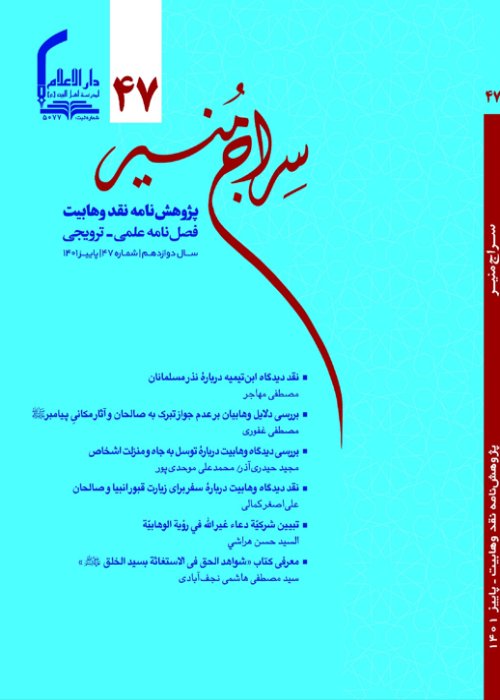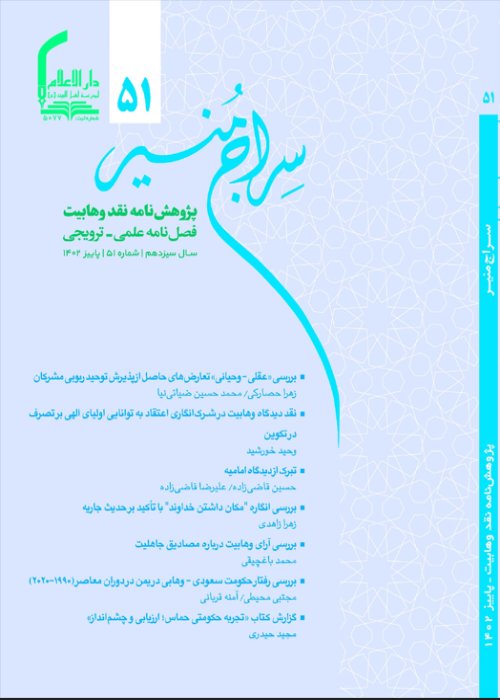فهرست مطالب

نشریه سراج منیر
سال دوازدهم شماره 47 (پاییز 1401)
- تاریخ انتشار: 1402/08/08
- تعداد عناوین: 6
-
صفحات 9-32یکی از نذرهایی که میان مسلمانان مرسوم است، نذر کردن برای خداوند همراه با اهدای ثواب و پاداش معنوی نذر به اموات است. از دیدگاه فقهی مذاهب اسلامی در جواز چنین نذری، هیچ ابهامی وجود ندارد؛ اما ابن تیمیه با تمسک به دلایلی آن را نه تنها جایز ندانسته؛ بلکه چنین نذری را شرک در عبادت پنداشته است. عمده ترین دلیل وی در این خصوص، روایات است. نگارنده در این تحقیق به تفصیل دلایل ابن تیمیه را بررسی کرده است و روایات مورد استدلال او را به لحاظ سندی و دلالتی به نقد کشیده است و در پایان باتوجه به دلایل جواز نذر، فتاوای فقهی و سیره عملی مسلمین، جواز این نوع از نذر را ثابت کرده است.کلیدواژگان: نذر، مذاهب اسلامی، ابن تیمیه، روایات
-
صفحات 33-51
مسیله «تبرک» ازجمله امور مورد قبول تمام مسلمانان است. همه مسلمانان بر جواز تبرک به آثار منفصل و جداشده از بدن پیامبر $، از قبیل مو، ناخن، عرق، آب دهان، آب وضو و لباس اتفاق نظر دارند، وهابیان نیز در این مسیله با سایر مسلمانان موافق هستند، اما آنان تبرک به آثار مکانی پیامبر (ص)، از قبیل حجره و قبر شریف آن حضرت را جایز نمی دانند و به ادله ای نیز استناد می کنند. وهابیان همچنین تبرک به صالحان و اولیا و آثار آنان را جایز نمی دانند و تبرک به شخص و آثار وی را از ویژگی های انحصاری پیامبر (ص) می دانند و تبرک به قبور صالحان را شرک می دانند، این درحالی است که تبرک به صالحان و آثار مکانی پیامبر (ص) نه تنها شرک و بدعت نیست؛ بلکه امری جایز است و دلایل مطرح شده از سوی وهابیت واهی و مخدوش است.
کلیدواژگان: تبرک، وهابیت، پیامبر، صالحان -
صفحات 53-74
محل اختلاف مسلمانان با وهابیت در مسیله توسل عبارت است از «توسل به اشخاص» که در قالب «توسل به ذات و جاه، مقام، حق و منزلت اشخاص» صورت می گیرد. در این نوشتار از چهار منظر به محل بحث پرداخته شده است: الف) توسل در سنت نبوی؛ ب) توسل در سیره اهل بیت (؛ ج) توسل در سیره صحابه؛ د) توسل از دیدگاه علمای مذاهب اسلامی. در این مباحث آیات و روایات از حیث دلالی و سندی بررسی شده اند. همچنین در انتها به سه شبهه مهم در این زمینه اشاره شده است.
کلیدواژگان: توسل، توسل به جاه، توسل به مقام، توسل به ذات، وهابیت و توسل -
صفحات 75-92
وهابیان در شد رحال و سفر برای زیارت قبور خدشه وارد کرده اند؛ آن را حرام و بدعت بر می شمارند. در این مقاله دلایل وهابیان در خصوص بدعی بودن شد رحال بیان شده و بررسی خواهد شد. به طور خاص روایت «لا تشد الرحال إلا إلی ثلاثه مساجد»، به عنوان اصلی ترین دلیل آنان بر حرمت و بدعت بودن سفر به جهت زیارت قبور، بررسی می گردد. نوشتار حاضر با استناد به سخنان عالمان اهل سنت، همچنین سیره سلف صالح و روایات بسیار زیاد در استحباب سفر برای زیارت، سستی کلام وهابیان در منع شد رحال و سفر برای زیارت قبور انبیاء و صالحان را اثبات کرده است.
کلیدواژگان: وهابیت، سفر برای زیارت قبور، شد رحال، زیارت -
صفحات 93-112
الوهابیون قاموا بتشریک من یدعو غیر الله تعالی علی نحو العباده والسوال، والحال ان هنالک فرقا بین الدعاء والعباده والسوال، ولیس کل دعاء وطلب یعد عباده، بل یفتقر إلی اعتقاد الربوبیه والإلوهیه ونیه العباده فی المدعو، والقصد من کتابه هذه المقاله، تعریف دعاء غیر الله لغویا واصطلاحیا ثم تجمیع شروطه وإثبات شرعیته بشروط، والرد علی ادعاء الوهابیین فی مساله دعاء غیر الله تعالی وترادفه للسوال والعباده، واقمنا ادله علی ما نحن بصدد إثباته من تشریح العباده وملاکاتها وتخلصنا بنتیجه.
کلیدواژگان: دعاء غیر الله، الوهابیه، التوحید الالوهی، شیوخ نجد، الشرک، العباده -
صفحات 113-123
کتاب شواهد الحق فی الإستغاثه بسید الخلق ازجمله کتاب هایی است که در نقد افکار وهابیت و درخصوص دیدگاه آنان درباره استغاثه، به رشته تحریر درآمده است. نویسنده این کتاب شیخ یوسف نبهانی، از علمای اهل سنت است. این اثر در 434 صفحه توسط دو انتشارات «دار الکتب العلمیه» و «دار التوفیقیه» به چاپ رسیده است. کتابی که در این گزارش به آن استناد شده، چاپ چهارم است که انتشارات «دار الکتب العلمیه» در سال 2011 میلادی، منتشر کرده است.
کلیدواژگان: گزارش کتاب، شواهد الحق، نبهانی
-
Pages 9-32One of customary vows among Muslims is vowing to God, but sending its rewards and benefits to the dead. From jurisprudential perspective, there is no doubt on the legitimacy of this act. But Ibn Taymiyyah did not consider it permissible, having his own reasons. He believes that this kind of vowing and sending the reward to the dead is a kind of polytheism in worshipping. His main reason is some Narration in this field. The writer of this essay with a descriptive analytic method has examined the reasons of Ibn Taymiyyah in detail. According to the findings of this research: the Ibn Taymiyyah's narrations in this filed is problematic in both authenticity of document and denotation. This kind of vow is legible according to the fatwas of Muslim Jurisprudents and the ancient behavior of Muslims through history.Keywords: Vowing, Islamic sects, Ibn Taymiyyah, hadiths
-
Pages 33-51
The issue of "blessing" is accepted by all Muslims. All Muslims agree on the permissibility of seeking bless from the reminders of the Holy prophet such as the parts separated from the Prophet's body, like hair, nails, sweat, saliva, ablution water, clothes, etc. Although Wahhabis also agree with other Muslims in this matter; They do not consider it permissible to seek bless from the places of the Holy Prophet (PBH) such as his holy chamber and grave, providing their own evidences. Wahhabis also do not consider it permissible to seek bless from the righteous and the saints and their reminders. The Wahhabists consider seeking bless from a person and his properties as one of the exclusive characteristics of the Holy Prophet (PBH) , Considering seeking bless from the graves of the righteous people as polytheism. The findings of this study show that seeking bless from the saints and the reminders of the Holy prophet is permissible and the arguments presented by Wahhabism are invalid.
Keywords: Seeking Bless, Wahhabism, the Holy Prophet, the Saints -
Pages 53-74
The dividing point between Muslims and Wahhabis in the issue of Supplication is that the Wahhabi believe that Supplication is "appealing to persons". In this essay and with a descriptive - analytic method, the issue of Supplication will be explained in four domains: Supplication in the tradition of the Holy prophet (PBH), Supplication in the life of the Ahlulbayt, Supplication in the life of companions of the Holy prophet, Supplication from viewpoint of Islamic scholars. At the end, some answers is given to the doubts of Wahhabism on this regard.
Keywords: supplication, dignity, Position, Wahhabism -
Pages 75-92
The Wahhabis maintain that travelling for visiting the graves is forbidden. They call it Haram and heresy. In this essay, the arguments of Wahhabis for not taking pilgrimage tour is studied and the famous Hadith, "No (religious) journey is to be undertaken except to (pray in) the three mosques" will be considered as the main evidence of Wahhabis. There is a misconception for the meaning of this Hadith. The findings of this research shows that we have many evidences from the words of great Sunni scholars, the life of prophet's disciples and the Hadiths that indicate taking pilgrimage tour is recommended and the Wahhabis' claim is invalid.
Keywords: Wahhabism, Travelling for Visiting the Graves, Preparation for Traveling, Visiting -
Pages 93-112
Wahhabis have considered those who call other than God Almighty to be polytheists, whether they intend to worshiping or not. While the fact is that there is a difference between praying, worshiping and requesting. Since every praying and requesting is not considered worshiping. Rather, worshiping requires having belief in the Lordship and divinity and the intention of worshipping. The purpose of writing this essay is to define lexically and technically the meaning of calling someone other than Allah, and then determine its conditions. The doubts of Wahhabis in this case will be answered, the supplication to other than Allah doesn't mean worshipping it. Also in this essay the true meaning of worshipping is explained and the findings is stated.
Keywords: Calling other than God, Wahhabism, Divine Monotheism, Sheikhs of Najd, Polytheism, Worshiping


